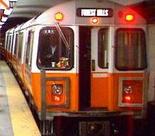This is an updated version of a story posted at 7 this morning.

The Massachusetts Senate voted to use an obscure surplus fund to eliminate a budget deficit for the public transit system in Greater Boston, the same day protesters in Springfield rallied against proposed fare hikes for Pioneer Valley’s public bus and van system.
The Senate vote came after senators on a voice vote rejected an amendment — cosponsored by Democratic Sens. Gale D. Candaras of Wilbraham and James T. Welch of West Springfield — to create a Springfield-like financial control board for the Massachusetts Bay Transportation Authority.
Candaras and Welch said a five-member control board would assume the powers of the current MBTA board and might be able to end repeated bailouts and bring some accountability to the agency.
 Gale Candaras
Gale Candaras
“For too long, we have been forced to bail out the MBTA,” said Candaras, whose amendment was cosponsored by three Republicans from the MBTA’s service area. “We have shared in that sacrifice over and over again.”
The Senate bill, approved by 26-9, would transfer to the MBTA a total of $49 million from a state fund made up of surplus automobile inspection fees paid by motorists.
Some lawmakers from communities far outside the Boston area criticized the plan to give the transit system inspection fee money that is collected statewide.
“This is an extremely bitter pill to swallow for the citizens of the commonwealth,” said Sen. Michael R. Knapik, a Westfield Republican.
As a compromise, regional transit authorities would also receive $3.5 million, including $2 million from the trust fund and $1.5 million in surplus snow removal funds.
The state House of Representatives approved the bill last week.
While senators debated in Boston, about two-dozen protesters from various community groups gathered Tuesday in Springfield to speak out against proposed Pioneer Valley Transportation Authority fare hikes.
“A lot of our members are on fixed incomes and cannot afford it,” said Vanessa N. Jameson of the Alliance to Develop Power.
If approved at a PVTA Board of Advisors meeting set for June 27, bus fares would go from $1.25 to $1.50 in July. An adult fare with a transfer from one bus route to another would go from $1.50 to $2.50 and a fare for a child ages 6 to 12 could go from 75 cents to $1. A 31-day pass would jump from $45 to $52. A one-day pass would go from $3 to $5, according to documents.
Click here to view the proposed fare increases in a chart.
For a time, the adult basic fare will remain unchanged at $1.25 if a rider uses a new smart card system. PVTA Administrator Mary L. MacInnes said Tuesday that two state budget measures now pending before the state Legislature could result in the PVTA receiving enough money to wipe out the $800,000 budget deficit the fare hike is meant to address.
But nothing from Beacon Hill is assured at this point and the PVTA has to move forward with its budget.
The Pioneer Valley authority provides fixed-route bus service and paratransit service to 24 communities, including Amherst, Chicopee, Holyoke, Northampton, Palmer, Springfield and Westfield. The service is used by elderly people, college students, the disabled and people without cars.
As current state subsidies, the MBTA currently receives about $770 million a year, or 20 percent of the state sales tax, Candaras said.
In addition, it receives another $160 million a year from the general fund, approved following a hike in the sales tax to 6.25 percent in 2009, according to Candaras.
Candaras said the nearly $1 billion in state subsidies for the MBTA is higher than state subsidies for similar transit agencies around the country. The MBTA’s budget is $1.7 billion.
The proposed control board would have consisted of the secretary of transportation, the MBTA board chairman and three members who live outside the agency’s service area.
Legislators said a control board worked in Springfield and it can work for the MBTA. A control board was in place in Springfield between 2004 and 2009.
The MBTA board voted in April to raise fares an average 23 percent and cut some service. But state transportation officials said the bailout was needed to close the remainder of the agency’s budget deficit and prevent deeper service reductions on July 1.
Senate President Therese Murray said the MBTA cannot keep coming back and asking for more money. “These measures will get us through the end of the fiscal year, but they are only a temporary solution,” Murray said in a statement.
Staff writer Jim Kinney contributed to this report.
